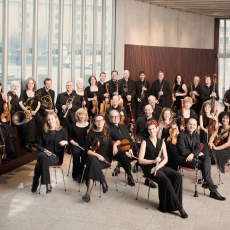Mozart Colloredo Serenade & Divertimento - SCO & Alexander Janiczek - BBC Online
Is it even possible for the Scottish Chamber Orchestra to do less than a superb job with Mozart? Their follow-up disc to Symphonies 38-41 with Sir Charles Mackerras hits the spot again with crisp, cohesive playing, delivered with a proper sense of fun.
Mozart had sent much of his teenage and childhood years touring Europe, so the years 1773-1777, following his seventeenth birthday, must have been somewhat of a relief for the lack of travelling. Staying put in Saltzburg meant that his services were called upon for all sorts of social events, hence these years produced a number of serenades. A serenade was basically entertainment music, midway between a symphony and a suite with its many movements. Nobody knows for sure for whom Mozart wrote his K203 Serenade in 1774; it has been dubbed the 'Colloredo' on the assumption that it was written for the name-day celebrations of Mozart's patron, Hieronymus, Count von Colloredo, the Prince-Archbishop of Saltzburg. On the other hand, with its accompanying march, it is structured very much like other serenades that Mozart wrote for the University philosophy students' end-of-year celebrations. Whoever it was written for, this is superior entertainment music, written with panache and bursting with sonorous and rhythmic colour; in addition to three minuets, and outer movements which form a symphony, there is a full three-movement violin concerto. The music exudes easy informality, bound together nevertheless with typical Mozartian precision, and that description just about sums up the orchestra's playing under Alexander Janiczek. It also sums up Janiczek's lyrical violin playing in the concerto section, complete with his own cadenzas.
Mozart's K251 divertimento, probably written for his sister's birthday, is a different kettle of fish. It is just as celebratory as the serenade, but is shorter and scored for just seven instruments. The entire forces of the SCO play it on this disc and, whilst Mozart would probably have expected one instrument per part (string quartet plus an oboist and two horns) the performance still works, as the scoring is more symphonic anyway, with less virtuosic soloist activity. Altogether, fine stuff.

